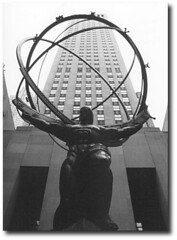The Average American: 1967 and Today
Forbes has a very interesting comparison between the economic situation of the average American in 1967 and today. Clearly things have improved tremendously: (all numbers were adjusted for inflation)
Median Income (Men)
1965 $28,599
2005 $41,386
Median Income (Women)
1965 $9,533 (33% of men)
2005 $31.858 (77% of men)
Changes in Purchasing Power
From 2005 - 10 years: 5.7% 20 years: 8.0% 30 year: 7.5% 40 years: 6.2%
Productivity Increases Since 1965
1965 (baseline)
2005 +220%
Home Ownership Percentage
1965 63%
2005 69%
However, the article mentions that "according to a Parade Magazine survey, 48% of Americans believe they're worse off than their parents were. A study by GFK-Roper group showed that 66% of Americans said that their personal situations in the "Good Old Days"--defined by the bulk of respondents as anywhere between the 1950s and the 1980s--were better than they are today. And in May, a Pew Research Center poll showed that half of U.S. adults believe the current trends point toward their children's future being worse than their own present."
How can that be? The article says that a lot of this current feeling of discontentment comes from the increase of inequality:
Income Share of Middle 60% of Wage Earners
1965 52.3%
2005 46.2%
Compensation of CEO of largest U.S. Corp. vs. Median Household
1965 Frederick Donner/General Motors 3.9 million (med. household income = 0.2%)
2005 Lee Scott/Wal-Mart $19 million (med. household income = 0.2%)
Compensation of highly paid athlete vs. Median Household
1965 Joe Namath/football $142,333 (med. household income = 5%)
2005 Tiger Woods/golf $87 million (median household income = 0.1%)
The cover story for Time follows the same line:
“The very idea of redistributing wealth can feel un-American in the land of Horatio Alger, until you look closely at how it's spread now. Half of us earn less than $30,000 a year, 90% less than $100,000. To get an idea of how we value our values, Howard Stern earns every 24 seconds what takes a cop or a teacher about a week.”
I just don’t buy this whole thing. What difference does it make whether Howard Stern or some football player makes millions? Do people think they are stealing money from them? If everybody were really so disgusted with this disparity, why would they keep listening to the radio/TV/sport shows and buying products these people sell?
It just doesn’t make sense.
I have a theory (impossible to proof of course) that all this complaining is caused by my favorite demon: press bias.
It should be obvious how this works. If you keep hearing that people are poor and that is unfair that Howard Stern makes gazillions of dollars a minute, you will eventually believe that this is common knowledge. And so, even if you personally don’t care about celebrity’s salaries or don’t really know that many people going through financial hardship, you assume that the problem is with you.
Michael Medved does a little thing on his radio show that illustrates how this works. Whenever someone calls to complain about the current economic situation, he asks whether that individual is personally going through a tough time, and whether he/she was better or worse 10 years ago. The huge majority always says they are doing ok, and justify their opinion saying that things are bad for other people, not themselves. What other people? They are not sure.
The numbers show that Americans have no reason to think that things are worse than before. On top of that, we need to remember all the immeasurable advances we benefit from. How do you calculate the benefit of paying 100 dollars in an air ticket that used to cost 300 before deregulation? How much better is your life because of the internet or better dental anesthesia?
So the big question is: Why is the press doing this?
Again, I think the answer is simple: politics and ideology. It is in the interest of “progressives” to propagate discontentment so people can keep looking for them for the so needed progress. If things are going great, conservatives have a natural advantage.
By the way, that is one of the reasons Fox News is so successful. It is not because it is more or less biased than other networks. It has also nothing to do with the fact that it is pro-Republican while the others are pro-Democrat (if that was the case audience would be horrible currently). The main difference is just the simple fact that it makes more sense to people to hear that things are not falling apart all the time.
Just because they are not.
